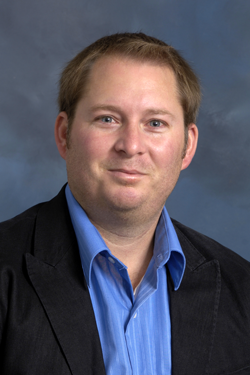Arnold School, MUSC, Clemson study part of DOE program for alternative fuels
August 2, 2010

Sean Norman
Arnold School of Public Health researcher Dr. Sean Norman is part of a scientific team developing a microbial fuel cell to convert carbon dioxide from the air into alcohol-based motor vehicle fuel.
The $2.4 million project may evoke images of medieval alchemists laboring to transmute lead into gold, but Norman said solid science exists behind the effort, titled “ Electroalcoholgenesis: Bioelectrochemical Reduction of CO2 to Butanol.”
Norman, an assistant professor in the Arnold School’s Department of Environmental Health Sciences at the University of South Carolina, will use $761,465 from the grant to identify specific microbes and the genetic pathways responsible for biofuel production. Other researchers on the study are from the Medical University of South Carolina and Clemson University.
“We’re providing electrons from a carbonless source to bacteria, which will then reduce CO2 to liquid fuels,” said Norman, director of the Arnold School’s Molecular Microbial Ecology Lab.
“Preliminary studies have found that bacteria evolve to become better producers of biofuel over time in the fuel cell environment,” he said.
In the long run, understanding the process by which the bacteria evolve can lead to the creation of highly efficient synthetic organisms, he said.
Norman compared the research to that of Craig Venter, the pioneering U.S. geneticist who built the genome of a bacterium from scratch and incorporated it into a cell to make the world’s first synthetic life form.
The South Carolina study is one of only 13 – including studies at Harvard, MIT and Columbia University -- supported by $40 million in funding through the U.S. Department of Energy’s Advanced Research Projects Agency-Energy. All are focused on studying alternative approaches to making butanol or other alcohol-based fuels out of existing and synthetic organisms. Each grant is for three years.
In theory, these approaches “could be 10 times more efficient” than the technologies used today to produce liquid biofuel, according to ARPA-E’s website.
Norman’s other co-principal researchers on the project include Dr. Harold May of MUSC and Dr. Mike Henson and Dr. Steve Creager, both of Clemson University. The study is housed at MUSC.



_01.jpg)
_02.jpg)